Nadal: “I can’t see myself playing at the same age as Federer”
Rafa Nadal, 31, is going into the 2018 season with the confidence gained from reclaiming the world number one ranking and adding to his haul of Grand Slam titles with victory at Roland Garros and the US Open</br><a title="Ryder Cup 2018 final day live: Europe vs USA, Sunday singles" href="https://en.as.com/en/2018/09/30/other_sports/1538308334_223057.html">Ryder Cup 2018 final day: Europe vs USA, Sunday singles</a>
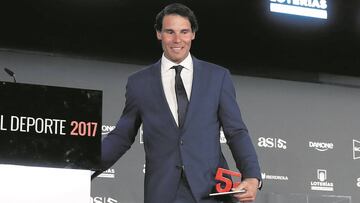
The Manacor born 31-year-old is going into the 2018 season with the confidence gained from reclaiming the world number one ranking and adding to his haul of Grand Slam titles with victory at Roland Garros and the US Open. To mark the 50th anniversary of AS, Nadal was named the greatest athlete in Spanish history, the perfect moment to recap a remarkable career that he describes as having “been more than I ever hoped for or imagined.”
When you were 16 years you said in a video that you preferred fast surfaces and grass to clay, and that you wanted to emulate Carlos Moyá. How things have changed…!
I haven’t seen the video but despite the slightly disproportionate success I’ve had on clay, I wasn’t coached for that surface. My uncle Toni, when I was a kid, didn’t train me to be a clay specialist, mentally or as a player. And despite what people think, I didn’t train that much on clay. But it’s true that my style of play and the success I had at the beginning of my career gave me a lot of confidence on the surface.
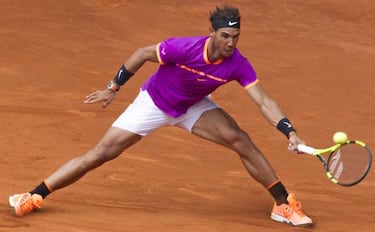
That seems odd now, under the circumstances…
I adapted very well to clay but the truth is that I always wanted to play well on grass because at that time it had been a while since any (male) Spanish players had been successful on grass. For me that was a huge source of motivation and I thought I had the ability to do well because at the end of the day if you have the desire to improve, you have the possibility of doing so. Doing so well on clay helped me to become better on grass as well. It’s a completely different game, but that confidence helped me. I started to adapt and to enjoy it although lately my knees haven’t allowed me to. This year I was in good shape, I enjoy grass and the surface is good for me.
Those were your dreams when you were a kid. What are your dreams now, if you have any pending?
Well, I don’t really have any dreams but everything that has happened in my career has been more than I ever hoped for or imagined. My motivation is the same as it has always been, to keep feeling that I’m competitive every year and to keep enjoying tennis. I am lucky enough to be doing something that makes me happy. If one day I lose that feeling when I’m pushing myself to achieve something in my sport, that will be the moment to start thinking about doing something else. My goal is to keep playing at a level that gives me a chance to compete for the things that really motivate me for as long as possible.
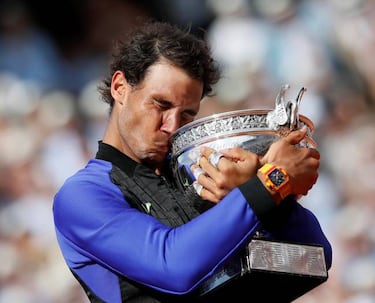
You’ve regained the world number one ranking, a special achievement. Is keeping it something you think about or is it not an objective in itself?
At this stage of my career it’s great that the opportunity to be world number one again presented itself. I took advantage of the chance and I’m happy to have done it, because it was results that took me there. But I never chased that objective and I never will. My challenge is to remain healthy and fight to be competitive because if I can do that then I’ll have the chance to achieve the things that I want to. If that isn’t the case, that’s when things start to get complicated. My calendar and my objectives are focused on staying fit and happy because at the end of the day obviously being number one is a source of happiness and it’s another achievement in my career. But these things are temporary and the important thing, particularly at my age, is being able to train and feeling ready to compete.
Does it motivate you to see Roger Federer still playing at the highest level at 36?
I’m not thinking about that. Everyone has their path and they are all different. I think that what is good for one person isn’t necessarily good for someone else. I’m 31 and the 37th birthday Federer is going to celebrate for me is a long way off. I just concentrate on my day-to-day and I doubt he was thinking down those lines six years ago. It depends on your fitness and your mind and where you want to go. When I was 26 I didn’t think about whether I’d still be playing at 31. And right now I can’t see myself playing at the same age as Federer. But you never know, because it’s all down to fitness, having the enthusiasm to carry on playing and being prepared to do so.
You’re getting close now to Federer’s career achievements…
At Grand Slam level I wouldn’t say so; he still has three more, which is a lot. It’s not something I think about anyway. I’m happy with what I’m doing and if things go well and that opportunity presents itself, then great. But when I hang up the rackets having overtaken Roger, if it happens, won’t give me more satisfaction in my career.
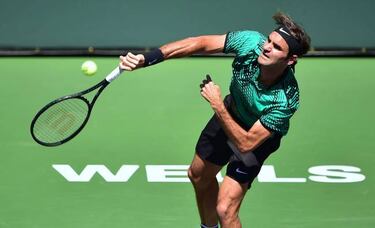
In the letter your uncle Toni published in El País he said he was demanding with you than full of praise…
We’ve always enjoyed a good relationship. My uncle is a very sensitive person but at the same time with a very strong character. The truth is he was a lot tougher on me when I was younger than later in my career. He has always been someone who has followed his own path and his own way of doing things. He isn’t one to dish out praise for nothing. He isn’t going to tell you that you’re playing well if you’re not and although sometimes lying to yourself can be beneficial in the short term in some circumstances he’s not going to sugar coat anything to give you a lift at a particular moment. He’s generally critical, like me, but more so.
Was there any point where you ever had any problems with each other?
Look, he’s a friendly guy, but when I was younger there were times when because of his desire for me to do things well training sessions were tense. Although I always knew very well that he was doing it for my own good. And I know that there are few people who could have wanted things to go well for me more than he did. That doesn’t mean that weren’t moments when I thought: “Shit, this guy’s a pain!” But when my temper cooled down I always understood that he was doing it all for me.
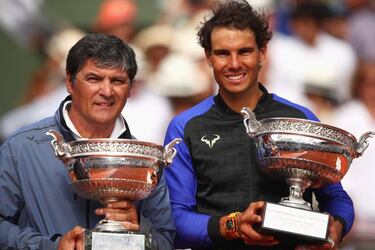
He obviously had an effect on you…
I couldn’t have ever asked for someone better to have at my side, because the spirit and character I have had on the court, and a lot of the tough situations I have come through, were because of those times we experienced together and during which he helped me to grow as a person and an athlete. I can’t say how grateful I am for everything he has done for me. He’s the most important person in my career.
How’s the transition with Carlos Moyá as your new coach going?
It’s good, we’ve had a fantastic year and we’ve worked really well together and formed a good team with Toni and Francis(co Roig). We’ve worked in every sense of the word. Now there is no transition; now the season starts with Carlos, who will work out the calendar and the training plan. It’s a new era, another day-to-day routine to adapt to. We’ll try to do everything as well as we can. Moyá has come in with ideas that have worked well and slightly new methods of working that have fitted everyone well. In general, we’re excited.
One aspect of your game that has improved the most is your second serve. You led the ATP Tour in 2017 in points won in that area…
I’ve been hitting second serves this year better than any season in my career. I managed to add a few kilometres an hour to my serve in general and I think that maybe even my second serve was better than my first. I could say that I won a lot of almost free points. I have to keep working on that because there have been two key things in my career, serving and returning; where points start and where I have to attack to not run more than I have to. My return this year has been very positive.
How do you have so much capacity to remember your games and statistics?
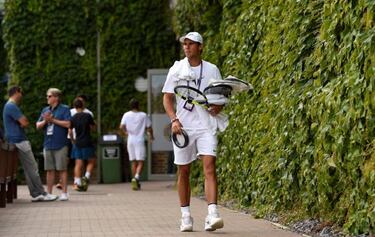
Before I had even more... After games I would remember everything. What you’ve done on court stays with you because it’s important to you.
Is your schedule for 2018, which starts in Brisbane in January, going to be similar to last year or are you going to skip any Masters 1000 tournaments? You can miss three because of the years you’ve put in on tour…
Related stories
It’s not that I haven’t got anything decided, because I have a very clear idea already, but your calendar is decided by results. I played 18 tournaments in 2017, which isn’t a lot, but I won a lot of games. Can you play less? Yes. Is it logical to? No. Did it work incredibly well for Federer? Yes. Was that logical? No. The way he went about his season was good because for him it was the best way to do it, but it didn’t stand to reason because it shouldn’t have been.
Why so?
It’s very easy to get yourself into a loop of lacking confidence when you play so little, but the fact is that Federer didn’t lose two consecutive matches. I don’t put that down to luck, because he was playing at an amazing level, but it’s a fine line. My calendar in 2017 was the right one for me, pretty much playing only the mandatory amount, except a tournament here or there picked for preparation. My idea for 2018 is similar and maybe I’ll play a couple more tournaments. That’s what I’m thinking, but it depends on results.
